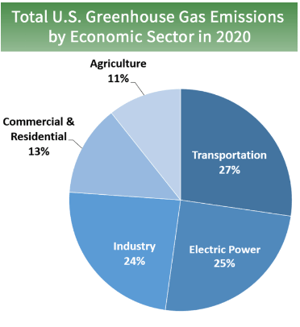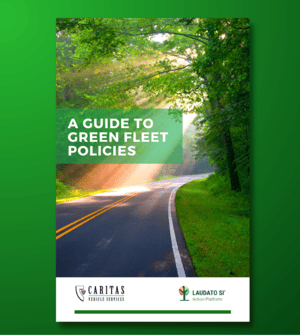 Here are several indisputable facts:
Here are several indisputable facts:
- The Earth rotates on an axis around the Sun
- Water is wet
- The globe is warming at an unprecendented rate, causing a myriad of issues from global ice caps melting to rampant wildfires in Australia and the U.S.
The statements above are scientific facts. According to Climate.gov, "... the combined land and ocean temperature has increased at an average rate of 0.14 degrees Fahrenheit (0.08 degrees Celsius) per decade since 1880; however, the average rate of increase since 1981 (0.18°C / 0.32°F) has been more than twice that rate."¹
But why are rising temperatures a problem? In their Global Climate Change Fact Sheet, NASA details several key impacts of rising global temperatures:
- The ocean is getting warmer. NASA writes of the potential consequences, "The effects of ocean warming include sea level rise due to thermal expansion, coral bleaching, accelerated melting of Earth’s major ice sheets, intensified hurricanes, and changes in ocean health and biochemistry"²
- The ice sheets are melting. Regarding the intesity of this issue, NASA writes, "'Greenland lost an average of 279 billion tons of ice per year between 1993 and 2019, while Antarctica lost about 148 billion tons of ice per year'"³
- Glaciers are retreating, potentially leaving some areas without the source of fresh water that they've relied on for millenia
- Snow cover is decreasing, affecting the habitats of arctic animals and disrupting ecosystems in the northern hemisphere
- Sea level is rising, threatening cities and residences at sea level in places like Florida and Louisiana
- Arctic sea ice is disappearing. According to the WWF, "Less ice means less reflected heat, meaning more intense heatwaves worldwide. But it also means more extreme winters: as the polar jet stream—a high-pressure wind that circles the Arctic region—is destabilized by warmer air, it can dip south, bringing bitter cold with it"⁴
- Extreme weather events are increasing in frequency, leading to mass displacement of populations in Australia, India & the U.S.
- Oceans are becoming more acidic, leading to drastic loss of marine life and thus harming fishing economies around the world
With these negative consequences in mind, it is important to understand what is driving climate change. As a fleet service company, Caritas is especially interested in reducing the greenhouse gas (GHG) emissions from vehicles of our own, as well as that of our esteemed clients'.

*https://www.epa.gov/ghgemissions/sources-greenhouse-gas-emissions
As reported by the EPA, transportation (counting both public and private) accounts for the largest source of GHG emissions in the U.S. Being a provider of fleet services for Catholic-religious, it is Caritas Vehicle Services' responsibility to be good stewards for our clients as well as the Earth. Therefore, when Pope Francis wrote his second encyclical, Laudato Si': On Care for Our Common Home, we actively engaged with the Catholic communities' vast global initiative.
Laudato Si' outlines goals of modesty and stewardship, which are described in the subsequent Laudato Si' Action Platform. According to the official Laudato Si' website, their Action Platform is, "... [a] unique collaboration between the Vatican, an international coalition of Catholic organizations, and 'all men and women of good will.' (Laudato Si', 3)...Taking a truly ground-up approach, it is rooted in the strengths and realities of communities around the world, empowering all to take 'decisive action, here and now' as we journey towards a better future together" (Laudato Si', 161).⁵

To pledge our commitment to Laudato Si', and to help our clients on their journey toward achieving net-zero carbon emissions, Caritas Vehicle Services developed the following e-book, A Guide to Green Fleet Policies.
A Guide to Green Fleet Policies serves as a helpful roadmap that provides "Best Practices" to efficiently and effectively reduce your fleet's carbon footprint. Its 23 pages will support your efforts to develop and implement a new "green policy" that will reduce both GHG emissions and transportation costs. Further, it offers many resources, including a carbon footprint calculator and links to organizations that are leading the effort towards achieving zero carbon emissions.
We are providing this e-book as a complimentary service. We hope it is everything you need to fulfill your community's Laudato Si' goals.
Now is the time to take a stand for the planet with your fellow, mission-oriented Catholic-religious. Click below to receive the brand new e-book today!
References
- Lindsey, Rebecca, and Luann Dahlman. “Climate Change: Global Temperature.” NOAA Climate.gov, 28 June 2022, https://www.climate.gov/news-features/understanding-climate/climate-change-global-temperature.
- “Ocean Warming.” NASA, NASA, https://climate.nasa.gov/vital-signs/ocean-warming/#:~:text=The%20effects%20of%20ocean%20warming,in%20ocean%20health%20and%20biochemistry
- “Evidence: How Do We Know Climate Change Is Real?” NASA, NASA, https://climate.nasa.gov/evidence/.
- Hancock, Lorin. “Six Ways Loss of Arctic Ice Impacts Everyone.” WWF, World Wildlife Fund, https://www.worldwildlife.org/pages/six-ways-loss-of-arctic-ice-impacts-everyone#:~:text=Less%20ice%20means%20less%20reflected,bringing%20bitter%20cold%20with%20it.
- “About The Platform.” Laudato Si' Action Platform, Dicastery for Promoting Integral Human Development, https://laudatosiactionplatform.org/about/.






